Wang Jiawei [Wong Kar-wai]: Behind the Dark Glasses
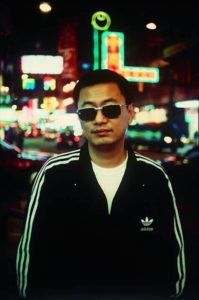 Showman, visual artist, cultural jackdaw, cinematic brand name – Wang Jiawei 王家卫 [Wong Kar-wai] has been called many things. What is indisputable is that he is Hong Kong’s most internationally recognised auteur. What is rather less recognised (largely among his western fans) is that he is hardly typical of the territory’s film industry and exists almost entirely in a universe of his own creation.
Showman, visual artist, cultural jackdaw, cinematic brand name – Wang Jiawei 王家卫 [Wong Kar-wai] has been called many things. What is indisputable is that he is Hong Kong’s most internationally recognised auteur. What is rather less recognised (largely among his western fans) is that he is hardly typical of the territory’s film industry and exists almost entirely in a universe of his own creation.
Wang was born not in Hong Kong but in mainland China, in Shanghai on 17 Jul 1956, and was raised speaking Mandarin and Shanghainese. Moving with his parents in 1963, at the age of seven, he grew up in an era when Hong Kong cinema was dominated by Mandarin-dialect movies that were made by and starred emigre talent from China and Southeast Asia that carried on a tradition (and values) dating back to pre-1949 Shanghai. Like anybody growing up in Hong Kong, Wang learned its local dialect of Cantonese, imported from the adjacent province of Guangdong. But like older film-makers of that era, such as Li Hanxiang 李翰祥 and Hu Jinquan 胡金铨 [King Hu], it was an acquired language and Hong Kong an acquired culture, not one in which his roots were.
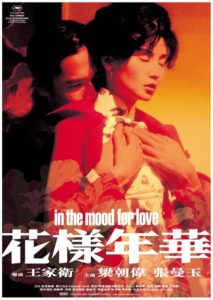 This sense of dislocation can be felt most strongly throughout In the Mood for Love 花样年华 (2000) which, though set in early 1960s Hong Kong, might just as well have been set in pre-1949 Shanghai, with its stylised period clothes, mix of East and West, and snatches of Shanghainese heard between the Cantonese dialogue. Though it’s one of Wang’s most superficial films – at least in the version that finally ended up on screen – it’s also, ironically, one of his most personal.
This sense of dislocation can be felt most strongly throughout In the Mood for Love 花样年华 (2000) which, though set in early 1960s Hong Kong, might just as well have been set in pre-1949 Shanghai, with its stylised period clothes, mix of East and West, and snatches of Shanghainese heard between the Cantonese dialogue. Though it’s one of Wang’s most superficial films – at least in the version that finally ended up on screen – it’s also, ironically, one of his most personal.
During the 1920s and 1930s, Shanghai’s industry had included a considerable number of Cantonese-speaking film-makers; after 1949, it was the turn of Hong Kong to welcome Mandarin speakers. Wang grew up there at a time when Hong Kong cinema thrived under a studio system ruled by the product of Shaw Brothers, MP&GI/Cathay and (later) Golden Harvest, and when some of the best martial arts fiction was written by names like Jin Yong 金庸 [Louis Cha]. He devoured both, and inherited their emigre dream worlds. After graduating in graphic design from Hong Kong Polytechnic College, and working his way up the traditional ladder from television (HKTVB) to film writing, he was given his first chance to direct by Deng Guangrong 邓光荣 [Alan Tang], a 1970s hearthrob-turned-producer.
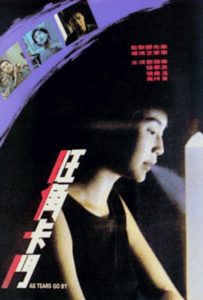 If any of Wong’s films can truly be called a “Hong Kong film”, As Tears Go By 旺角卡门 (1988) is it. Totally typical in content to other youth/crime melodramas of the period, its only distinguishing mark is its visual style, whose blurred motion and expressionistic use of colour forecasts the much more stylish Chung King Express 重庆森林 (1994). Apart from The Grandmaster 一代宗师 (2013), it remains Wang’s biggest local success – helped by having three name attractions in Liu Dehua 刘德华 [Andy Lau], Zhang Xueyou 张学友 [Jacky Cheung] and Zhang Manyu 张曼玉 [Maggie Cheung] – and is truly about contemporary Hong Kong life. But even here there are undercurrents of nostalgia that are completely alien to most of the territory’s film-makers.
If any of Wong’s films can truly be called a “Hong Kong film”, As Tears Go By 旺角卡门 (1988) is it. Totally typical in content to other youth/crime melodramas of the period, its only distinguishing mark is its visual style, whose blurred motion and expressionistic use of colour forecasts the much more stylish Chung King Express 重庆森林 (1994). Apart from The Grandmaster 一代宗师 (2013), it remains Wang’s biggest local success – helped by having three name attractions in Liu Dehua 刘德华 [Andy Lau], Zhang Xueyou 张学友 [Jacky Cheung] and Zhang Manyu 张曼玉 [Maggie Cheung] – and is truly about contemporary Hong Kong life. But even here there are undercurrents of nostalgia that are completely alien to most of the territory’s film-makers.
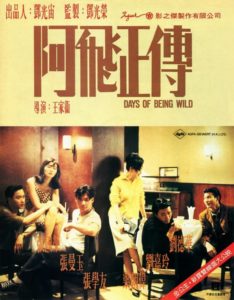 Thereafter, Wang rapidly built himself into a brand name in the space of only a couple of movies: Days of Being Wild 阿飞正传 (1990) and Chung King Express, the latter rapidly shot during a break in the draining experience of making martial-arts epic Ashes of Time 东邪西毒 (1994). Both inhabited a territory best described as Wang Jiawei-dom, the first set in a nostalgic evocation of 1960s Hong Kong, the second in the inner worlds of two contemporary policemen and their fascination with various quirky women. With its musicvideo/commercials style and pacing, and use of iconic actors, Chung King Express – which was actually two separate stories pasted together – became the first full demonstration of the Wang brand.
Thereafter, Wang rapidly built himself into a brand name in the space of only a couple of movies: Days of Being Wild 阿飞正传 (1990) and Chung King Express, the latter rapidly shot during a break in the draining experience of making martial-arts epic Ashes of Time 东邪西毒 (1994). Both inhabited a territory best described as Wang Jiawei-dom, the first set in a nostalgic evocation of 1960s Hong Kong, the second in the inner worlds of two contemporary policemen and their fascination with various quirky women. With its musicvideo/commercials style and pacing, and use of iconic actors, Chung King Express – which was actually two separate stories pasted together – became the first full demonstration of the Wang brand.
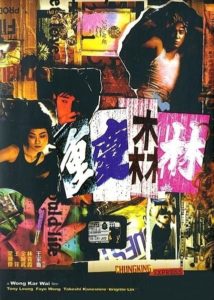 Wang quickly became a favourite of film festivals and western critics, who found much to analyse in the pop-culture references that transcended boundaries in a way that other Chinese films didn’t. And like many directors raised to instant auteur levels, he was treated at a much more intellectual level than Wang himself probably ever intended. From his work (often uncredited) with his longtime business partner, director Liu Zhenwei 刘镇伟 [Jeff Lau], to his interest in graphic design and popular fiction, and copious advertising work, Wang has always been a populist at heart, more interested in surfaces than analysis.
Wang quickly became a favourite of film festivals and western critics, who found much to analyse in the pop-culture references that transcended boundaries in a way that other Chinese films didn’t. And like many directors raised to instant auteur levels, he was treated at a much more intellectual level than Wang himself probably ever intended. From his work (often uncredited) with his longtime business partner, director Liu Zhenwei 刘镇伟 [Jeff Lau], to his interest in graphic design and popular fiction, and copious advertising work, Wang has always been a populist at heart, more interested in surfaces than analysis.
If one of the themes of his latest film, The Grandmaster, is the difference between those who choose public “face” over inner values, Wang himself is the former. That’s not to put him down: Wang remains a supreme visual stylist who has transformed his own private interest in nostalgia for things lost and unregainable into memorable screen imagery. His movies aren’t much deeper than they appear on the surface, he has little command of traditional film structure, and (as My Blueberry Nights 蓝莓之夜, 2007, showed) his dialogue doesn’t translate into English.
Sometimes the mix works – as in his majestic tribute to martial arts novels Ashes of Time, the playful Chung King Express, melancholic love story Happy Together 春光乍泄 (1997), or chunks of 2046 (2004) and The Grandmaster. Sometimes it doesn’t – as in the repetitive, rondo-like As Tears Go By and simply chaotic Fallen Angels 堕落天使 (1995). But even after two decades, a new Wang Jiawei film is still an event, as nobody knows better than Wang himself.
Working with Wang
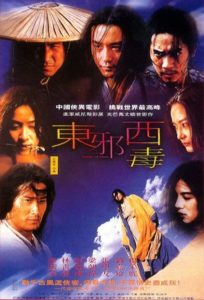 Wang’s famously instinctive way of working – which started with his second feature, Days of Being Wild 阿飞正传, increased significantly during his fourth, Ashes of Time 东邪西毒, and became a major publicity event during the last-minute arrival at Cannes of 2046 – has become as much a part of his image as the films themselves. It’s a tradition once played on a grand scale by US director Stanley Kubrick, and still pursued more minutely, in East Asia, by directors like South Korea’s Hong Sang-su 홍상수 | 洪常秀, equally well-known for changing his mind, writing dialogue on set, and “feeling” his way into a movie. Like all these auteurs, however, Wang still commands considerable loyalty from actors and technicians, even though they realise that signing on can be the equivalent of writing a blank cheque.
Wang’s famously instinctive way of working – which started with his second feature, Days of Being Wild 阿飞正传, increased significantly during his fourth, Ashes of Time 东邪西毒, and became a major publicity event during the last-minute arrival at Cannes of 2046 – has become as much a part of his image as the films themselves. It’s a tradition once played on a grand scale by US director Stanley Kubrick, and still pursued more minutely, in East Asia, by directors like South Korea’s Hong Sang-su 홍상수 | 洪常秀, equally well-known for changing his mind, writing dialogue on set, and “feeling” his way into a movie. Like all these auteurs, however, Wang still commands considerable loyalty from actors and technicians, even though they realise that signing on can be the equivalent of writing a blank cheque.
Liang Chaowei 梁朝伟 [Tony Leung Chiu-wai]
Liang remains Wang’s most faithful collaborator, working on seven of his films (though he’s only in the final scene of Days of Being Wild 阿飞正传, for a sequel that was never made) and owing much of his international reputation to them. Unlike many directors, Wang casts Liang in roles that capitalise on his more melancholic side than his pure good looks (earlier very boyish, latterly more like an East Asian Clark Gable). In Chung King Express 重庆森林 he played a morose policeman, dumped by his girlfriend, who meets a lively snack-bar worker (Wang Fei 王菲); in Ashes of Time 东邪西毒, a malevolent 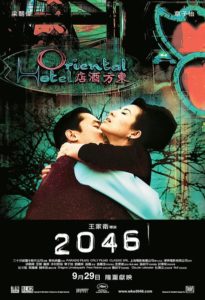 swordsman; in Happy Together 春光乍泄 the more serious, caring partner in a volatile gay relationship; and in In the Mood for Love 花样年华 a quiet, married journalist embarking on an affair with a married secretary (Zhang Manyu 张曼玉). His most nuanced performance remains that in 2046, in which he plays the same character from Mood but with more of a gigolo emphasis. In The Grandmaster 一代宗师 he reteams with Mainland actress Zhang Ziyi 章子怡 (also excellent in 2046) in his lightest role in a Wang film, martial arts master Ye Wen 叶问 [Ip Man]. Well-known for sticking to projects and not bouncing around from film to film like many Hong Kong actors, Liang remains Wang’s longest lasting male icon. His wife, [Shanghai-born] actress Liu Jialing 刘嘉玲 [Carina Lau], has had parts in Days, Ashes and 2046.
swordsman; in Happy Together 春光乍泄 the more serious, caring partner in a volatile gay relationship; and in In the Mood for Love 花样年华 a quiet, married journalist embarking on an affair with a married secretary (Zhang Manyu 张曼玉). His most nuanced performance remains that in 2046, in which he plays the same character from Mood but with more of a gigolo emphasis. In The Grandmaster 一代宗师 he reteams with Mainland actress Zhang Ziyi 章子怡 (also excellent in 2046) in his lightest role in a Wang film, martial arts master Ye Wen 叶问 [Ip Man]. Well-known for sticking to projects and not bouncing around from film to film like many Hong Kong actors, Liang remains Wang’s longest lasting male icon. His wife, [Shanghai-born] actress Liu Jialing 刘嘉玲 [Carina Lau], has had parts in Days, Ashes and 2046.
Zhang Manyu 张曼玉 [Maggie Cheung]
Wang’s original poster-girl, who starred in his first three films and then, after a break, in In the Mood for Love 花样年华, Zhang found the 15-month shooting schedule for the movie (and hours spent in make-up and qipao fittings) ennervating. She agreed to play in the sequel, 2046, but threw in the towel during production and was essentially replaced by Gong Li 巩俐 as the film was re-jigged. (Billed as making a “special appearance”, she’s in it only for a couple of seconds.) Zhang’s decision came at a time when she was essentially retiring from acting after 20 years on the Hong Kong treadmill, but of her 80-odd films a large part of her screen legacy (especially for western fans) resides in her work for Wang, most iconically in Mood and as less of a clotheshorse in Days of Being Wild 阿飞正传 and Ashes of Time 东邪西毒.
Zhang Zhen 张震
Taiwan’s Zhang has gone from playing a gay lover in Happy Together 春光乍泄, through bit parts in 2046, to being almost entirely left on the cutting-room floor in The Grandmaster 一代宗师, where his unexplained character appears in only three sequences lasting at total of nine minutes. Zhang, who trained seriously for the role of a martial-arts master, may hopefully see his role restored in a later redux version, as it’s potentially one of the strongest and most interesting in the picture.
Lin Qingxia 林青霞 [Brigitte Lin]
Taiwan’s Lin, now retired, only appeared in two Wang movies, but in equally iconic performances, as a swordswoman in Ashes of Time 东邪西毒 and as a blonde-haired, sunglasses-wearing drug smuggler in Chung King Express 重庆森林. Both were made at time when Lin, who’d become a major star in 1970s Taiwan, largely in romantic dramas, was re-locating her career to Hong Kong.
Zhang Guorong 张国荣 [Leslie Cheung]
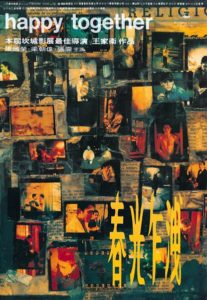 Hong Kong singing/acting star Zhang, who committed suicide in 2003, was a mainstay of Wang’s early films, as a playboy in Days of Being Wild 阿飞正传, a heartless swordsman in Ashes of Time 东邪西毒, and an unstable gay lover (paired with Liang Chaowei 梁朝伟) in Happy Together 春光乍泄. Zhang’s career as an actor did not rely on Wang’s movies but he certainly extended his limited range in them, especially in the latter two and notably in Happy, one of the rare occasions for the era of a gay Hong Kong actor playing a serious gay role.
Hong Kong singing/acting star Zhang, who committed suicide in 2003, was a mainstay of Wang’s early films, as a playboy in Days of Being Wild 阿飞正传, a heartless swordsman in Ashes of Time 东邪西毒, and an unstable gay lover (paired with Liang Chaowei 梁朝伟) in Happy Together 春光乍泄. Zhang’s career as an actor did not rely on Wang’s movies but he certainly extended his limited range in them, especially in the latter two and notably in Happy, one of the rare occasions for the era of a gay Hong Kong actor playing a serious gay role.
Christopher Doyle 杜可风
Australian-born d.p. Doyle has wholly or partly shot seven of Wong’s 10 features, and remains his best-known visual collaborator apart from art director/editor Zhang Shuping 张叔平 [William Chang]. Due to scheduling conflicts during their long shoots, Doyle was 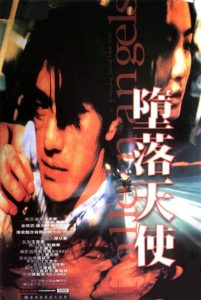 replaced on In the Mood for Love 花样年华 by Taiwan d.p. Li Pingbin 李屏宾 [Mark Lee] and on 2046 by Hong Kongers Li Yaohui 黎耀辉 [Lai Yiu-fai] and Guan Benliang 关本良 [Kwan Pun-leung], and has never worked with Wang since. Doyle’s love of exploratory techniques has given Wang’s earlier films – before he switched to a more burnished style – a distinct edge: the play with colour in Ashes of Time 东邪西毒, the grainy, high-contrast look of Happy Together 春光乍泄 (using “forced” 35mm), the wacky, on-the-run style of Fallen Angels 堕落天使. With Doyle in many respects as “instinctive” a worker as Wang, it was a golden, decade-plus relationship that was almost fated not to last, especially as Doyle became more and more well-known in his own right. But it has left a unique visual legacy.
replaced on In the Mood for Love 花样年华 by Taiwan d.p. Li Pingbin 李屏宾 [Mark Lee] and on 2046 by Hong Kongers Li Yaohui 黎耀辉 [Lai Yiu-fai] and Guan Benliang 关本良 [Kwan Pun-leung], and has never worked with Wang since. Doyle’s love of exploratory techniques has given Wang’s earlier films – before he switched to a more burnished style – a distinct edge: the play with colour in Ashes of Time 东邪西毒, the grainy, high-contrast look of Happy Together 春光乍泄 (using “forced” 35mm), the wacky, on-the-run style of Fallen Angels 堕落天使. With Doyle in many respects as “instinctive” a worker as Wang, it was a golden, decade-plus relationship that was almost fated not to last, especially as Doyle became more and more well-known in his own right. But it has left a unique visual legacy.
Zhang Shuping 张叔平 [William Chang]
A prolific production/costume designer and editor who’s worked with some of Chinese cinema’s major stylists like Guan Jinpeng 关锦鹏 [Stanley Kwan], Chen Kaige 陈凯歌, Yan Hao 严浩 [Yim Ho] and Yu Rentai 于仁泰 [Ronny Yu], Zhang has partnered Wang on all his films, ranking as one of the great director-editor relationships in world cinema. As a designer, Zhang is known for his elaborate look, especially in costume movies, and as an editor for his versatility, from the apparently conventional to the more risk-taking, but insists he has no “style” of his own. Famously camera-shy and introverted, Zhang is given a lot of freedom by directors that trust him and prefers not to collaborate with those that don’t. (He no longer works with Mainland film-makers.) Zhang and Wang have been friends for over a quarter of a century: “We each know what the other wants,” says Zhang simply.
(Originally published on Film Business Asia, 9 Feb 2013.)
Wang Jiawei: films as director
1988 As Tears Go By 旺角卡门
1990 Days of Being Wild 阿飞正传
1994 Chung King Express 重庆森林
1994 Ashes of Time 东邪西毒
1995 Fallen Angels 堕落天使
1997 Happy Together 春光乍泄
2000 In the Mood for Love 花样年华
2004 2046
2007 My Blueberry Nights 蓝莓之夜
2008 Ashes of Time: Redux 东邪西毒 (restored/revisited version of the 1994 film)
2013 The Grandmaster 一代宗师